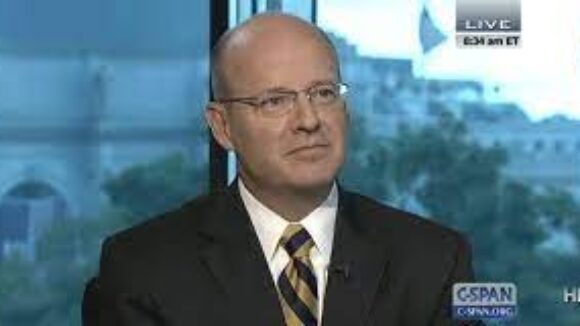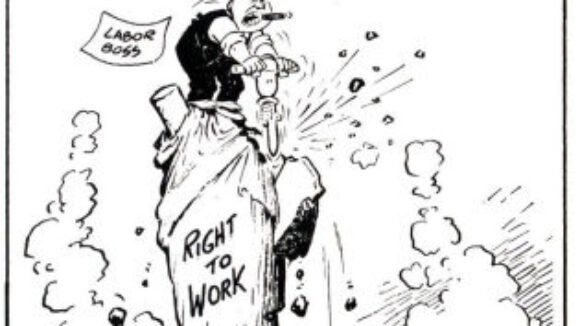Gompers Prep Academy Forced Into A Union Through "Card Checks"
Gompers Preparatory School is being forced under a union monopoly once again through "card checks".

Gompers Preparatory School is being forced under a union monopoly once again through "card checks".

Jeff Jacoby, a columnist for The Boston Globe, blasts Big Labor's "shameless pretext" for fighting without abandon against Right To Work Freedom: SOON -- PERHAPS AS EARLY AS TODAY -- Gov. Mitch Daniels will sign legislation making Indiana the nation's 23rd right-to-work state. Labor unions angrily oppose the change, but their opposition has no legitimate or principled basis. State right-to-work laws, authorized by the Taft-Hartley Act of 1947, are not anti-union. They are pro-choice: They protect workers from being forced to join or pay fees to a labor union as a condition of keeping a job. In non-right-to-work states, employees who work in a "union shop" are compelled to fork over part of each paycheck to a labor organization -- even if they want nothing to do with unions, let alone to be represented by one. Laws like the one Indiana is poised to enact simply make union support voluntary. Hoosiers can't be required to kick back part of their wages to the Republican Party or the Methodist Church or the Animal Liberation Front; the new measure will ensure that they don't have to give a cut of everything they earn to labor unions, either. Most Americans regard compulsory unionism as unconscionable. In a new Rasmussen survey, 74 percent of likely voters say non-union workers should not have to pay dues against their will. Once upon a time, labor movement giants like Samuel Gompers, a founder of the American Federation of Labor, agreed. "I want to urge devotion to the fundamentals of human liberty -- the principles of voluntarism," declared Gompers in his last speech to the AFL in 1924. "No lasting gain has ever come from compulsion." Those words can be seen chiseled on Gompers's memorial in Washington, DC. So as a matter of by-any-means-necessary expediency, it is easy to understand why Big Labor long ago embraced what liberal scholar Robert Reich (who served as Bill Clinton's secretary of labor) dubbed "the necessity for coercion." In order "to maintain themselves," Reich said in 1985, "unions have got to have some ability to strap their members to the mast." Or, as Don Corleone might have put it, to make them an offer they can't refuse. But is there any ethical reason -- any honorable basis -- for the union shop?

Jeff Jacoby, a columnist for The Boston Globe, blasts Big Labor's "shameless pretext" for fighting without abandon against Right To Work Freedom: SOON -- PERHAPS AS EARLY AS TODAY -- Gov. Mitch Daniels will sign legislation making Indiana the nation's 23rd right-to-work state. Labor unions angrily oppose the change, but their opposition has no legitimate or principled basis. State right-to-work laws, authorized by the Taft-Hartley Act of 1947, are not anti-union. They are pro-choice: They protect workers from being forced to join or pay fees to a labor union as a condition of keeping a job. In non-right-to-work states, employees who work in a "union shop" are compelled to fork over part of each paycheck to a labor organization -- even if they want nothing to do with unions, let alone to be represented by one. Laws like the one Indiana is poised to enact simply make union support voluntary. Hoosiers can't be required to kick back part of their wages to the Republican Party or the Methodist Church or the Animal Liberation Front; the new measure will ensure that they don't have to give a cut of everything they earn to labor unions, either. Most Americans regard compulsory unionism as unconscionable. In a new Rasmussen survey, 74 percent of likely voters say non-union workers should not have to pay dues against their will. Once upon a time, labor movement giants like Samuel Gompers, a founder of the American Federation of Labor, agreed. "I want to urge devotion to the fundamentals of human liberty -- the principles of voluntarism," declared Gompers in his last speech to the AFL in 1924. "No lasting gain has ever come from compulsion." Those words can be seen chiseled on Gompers's memorial in Washington, DC. So as a matter of by-any-means-necessary expediency, it is easy to understand why Big Labor long ago embraced what liberal scholar Robert Reich (who served as Bill Clinton's secretary of labor) dubbed "the necessity for coercion." In order "to maintain themselves," Reich said in 1985, "unions have got to have some ability to strap their members to the mast." Or, as Don Corleone might have put it, to make them an offer they can't refuse. But is there any ethical reason -- any honorable basis -- for the union shop?
"If we are serious about growing the economy and creating jobs, it is imperative that the Legislature pass right-to-work as soon as possible," opines New Hampshire State Rep. Gary Daniels. Daniels understands that his state can become a bastion of prosperity in the heavily taxed and over regulated Northeast, becoming a new haven for job creation -- if only the governor would get out of the way: Most state legislators hear regularly from our constituents about their top concerns. While the national debt and international engagements certainly carry a great deal of interest nationally, and balancing the budget without raising taxes or fees garners a lot of attention at the state level, by far the top issue remains creating good, new jobs and getting our economy growing robustly again. That's why it is so critical for New Hampshire to pass a law to become the 23rd right-to-work state and the only one in the Northeast. One of the major initiatives of this Legislature is creating and reestablishing pro-economic growth policies that are so critical for drawing businesses to the state and creating jobs, and then maintaining that environment so that businesses have the opportunity to succeed. Right-to-work is a major part of the puzzle. What is right-to-work? In short, it guarantees that no employee will be forced to join, or not to join a union, or pay dues or fees to a union, to get or keep a job. These days, finding steady employment is difficult for many people. However, it's simply unacceptable that anyone should be forced to pay dues or fees to a union to get or keep a job. How far we have strayed from the words of Samuel Gompers, the founder of the American labor movement, when he said, "The workers of America adhere to voluntary institutions in preference to compulsory systems, which are held to be not only impractical, but a menace to their rights, welfare and theirliberty," further noting that "no lasting gain has ever come from compulsion."